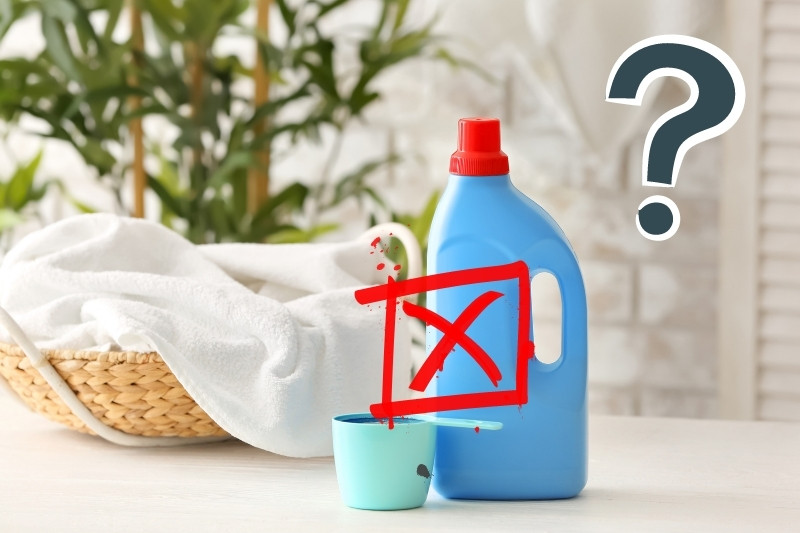There is a wide range of laundry detergents on the market designed to help your machine work better, clean your clothes, and make them last a long time.
But what happens if you run out? Can you still wash your clothes?
Here we’ll look at what happens if you’ve either forgotten to add the detergent or have run out and still want to wash your clothes.
Read on to learn the answer to these questions and the role of detergent in washing machines.
How Does Detergent Work on Clothes?
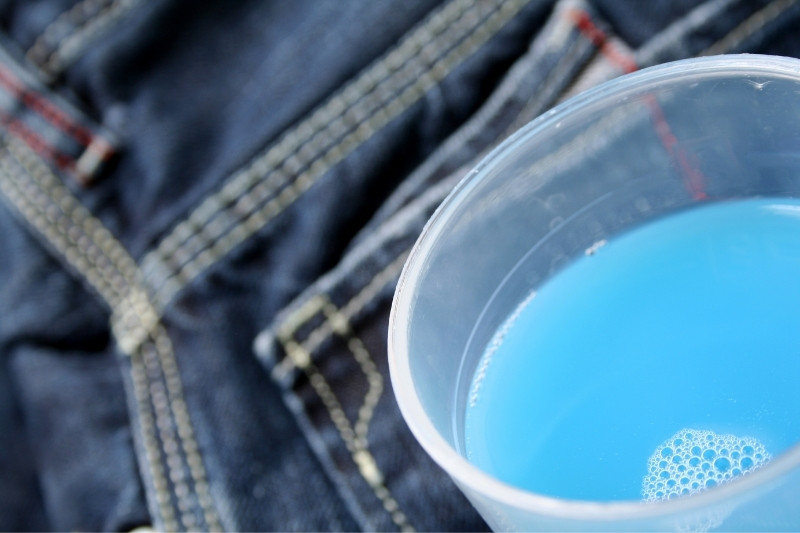
To find out what happens to your clothes when you wash them without a detergent, first, you need to learn how laundry detergents work.
Despite containing several components, detergents usually have only one ingredient that effectively cleans your clothes.
These are called surface-active agents, or surfactants for short. They have a unique chemical structure, due to which they can interact with both oil and water surfaces.
When you place a detergent with the surfactant into the water, one end of the surfactant molecule is immediately attracted to the water. If you put oil-stained clothes into the water with surfactants, the other end of their molecules will attach to the oil.
Your washing machines move the clothes around, getting more and more surfactant molecules attached to the stains.
The molecules then detach from the clothes, pulling away from the stains and forming tiny spheres around them. They remain suspended in water until the washer rinses them away by draining the water.
The other ingredients in detergents can include bleach, enzymes, and builders which are designed to help the surfactants maintain their optimal function, regardless of the water type, and temperature.
The entire formula of a laundry detergent is created with the purpose of drawing away grime without letting it return to the clothes or damaging them along the way.
What Happens to Your Clothes if You Don’t Use Detergent?
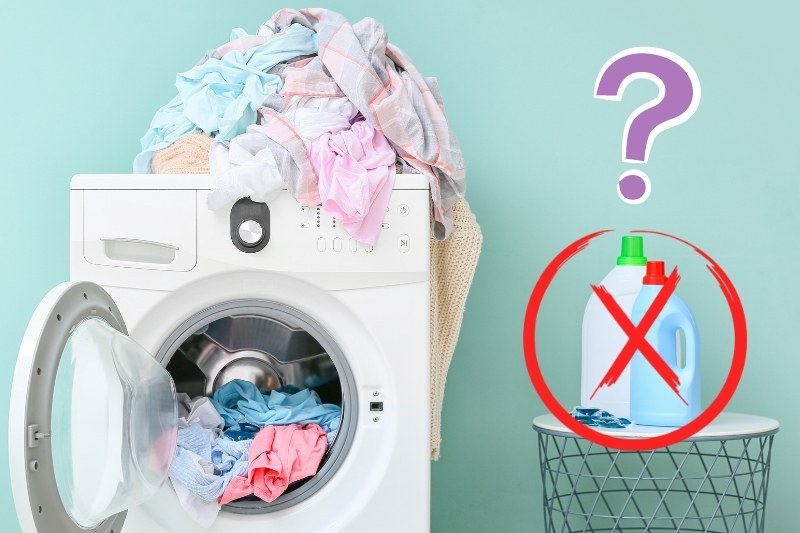
The answer to this question depends on many factors. For example, if your clothes were not too dirty, and you washed them at higher temperatures, there is a good chance they will be spotless as you may not need surfactants to clean them.
However, if they are oil-stained, sweaty, or otherwise dirty, you can’t expect them to get totally clean without using a surfactant.
Only if your machine had a hefty layer of detergent buildup can you remove the stains from your clothes without adding more surfactants.
If you accidentally forget to put laundry detergent into your machine before starting it, washing clothes at high temperatures may remove some water-soluble stains.
However, the odour will still remain, and it may even intensify as the clothes dry because you haven’t used any agents to remove them.
You can try to remove this odour by soaking them in water-vinegar solution or by simply airing them out.
Even washing your garments by hand requires some detergent. This is particularly true when using low temperatures, which is often recommended by the manufacturer.
The only exception to this rule is clothes labelled “dry clean only” which don’t need water or water-soluble detergent.
How Does Using Detergent Affect the Washing Machine?
While using too much detergent can lead to a build-up in your machine and on your clothes, not using it can also damage your washer.
Lots of parts of the UK have hard water, which is packed with minerals that cause limescale on any device using water. The limescale deposits will eventually prevent certain parts of the machines from functioning properly, decreasing their longevity.
By using a detergent for washing our clothes, you can help prevent any breakdowns and keep your machine running for a long time. This is because modern laundry detergents typically have components that can remove limescale deposits.
However, you must remember that these might not activate in low temperatures, so make sure to alternate your cycles between low and high temperatures.
Washing your clothes all over again if they remain stained after washing them without detergent also affects the longevity of your machine.
As with all electronic devices, the more you use them, the higher the chances will be for them to break down.
Not to mention how much energy you’ll be wasting and the bills you’ll be racking up by constantly running your machine.
Even if you use short, low-temperature cycles, the more you try to save, the more you’ll lose, and it won’t be good for the environment either.
Do Alternative Detergent Options Work?
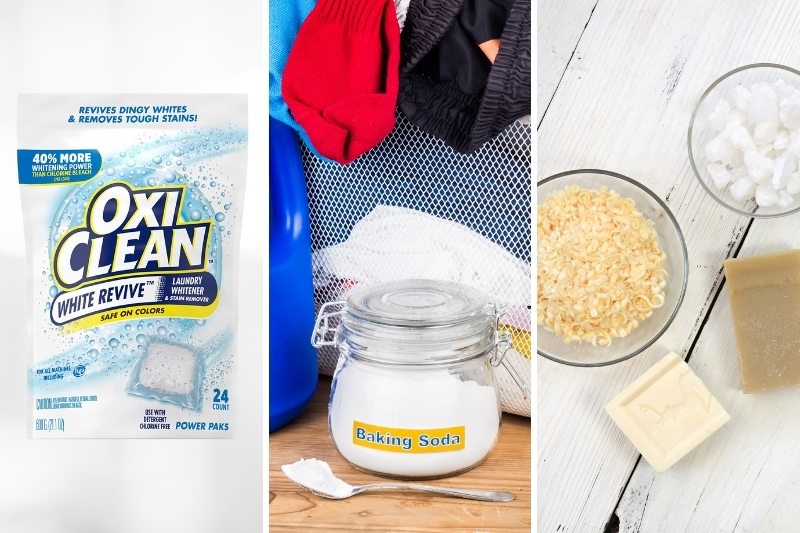
There are some alternative detergent options that may help you remove the stains as laundry detergents do, but the results may not be as satisfactory.
For example, soap also contains surfactants, which will attach to the stains, but lacks the other agents that make your garments look crispy clean, and fresh.
Oxygen bleach can also help restore the brightness to the clothes, and may even be effective in removing the dirt.
However, this depends on the temperature used in the washing cycle and the machine itself, as some modern highly-efficient devices are designed to work optimally only with laundry detergents.
Bicarbonate of soda is another popular option that claims to replace laundry detergent. Adding lemon juice or white vinegar is also recommended to enhance the cleaning effects of the bicarbonate of soda, but finding the right ratio may be too tricky.
Using shampoo, liquid soap, or dish soap is not recommended even for one-time use as they all create too many suds. Rinsing this out is almost impossible, and it requires wasting too much water and energy.
Tips for Reducing Detergent Use
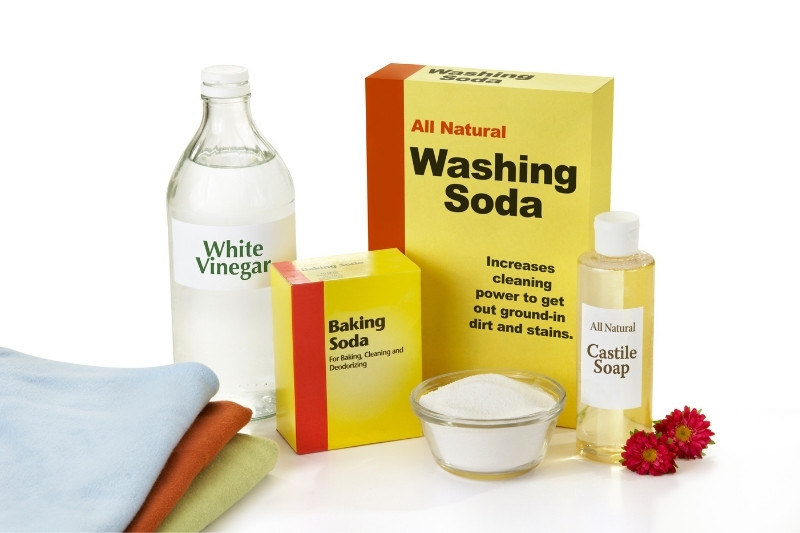
If you are worried about how using laundry detergent impacts the environment, you can try to reduce its effects.
The good news is, that you can do this without completely eliminating it. For example, you can soak up your garments in a water-vinegar solution before sending them through a washing cycle.
This will loosen up the stains and allow you to use less detergent during the wash.
You may also add oxygen bleach to the garments you want to refreshen without using too much detergent.
Most importantly, if you want to use less detergent, you’ll also need to wash your clothes at higher temperatures. Try avoiding short cycles as much as your time allows it.
Conclusion
As you can see, there are some excellent reasons to use detergent for washing your clothes. Depending on how dirty your clothes are, you may have to send them through another cycle if you wash them without just water.
This increases your energy bills and decreases the longevity of your machine and clothes. Doing it too often can lead to limescale build-up, particularly if you have hard water and use short, low-temperature cycles.
Using substitutes for detergent may seem a more ecologically-friendly solution. However, if they don’t properly clean your clothes, you may be wasting resources instead of saving them.
If you want to lessen your ecological footprint by reducing your detergent use, try pre-soaking your clothes. This way, they will require less surfactant to make them clean.

I’m a mother of three who loves going on fun adventures with my family. With three little ones, I’ve learned the hard way how to keep a busy home clean! I want to share my tips and tricks to make your life as easy as possible.
